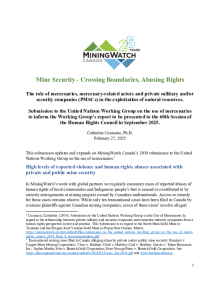Alert: Violence Against Peaceful Anti-Mining Resistance in Azuay, Ecuador
On Thursday, March 6th, four members of the peaceful resistance to protect the Kimsakocha páramo in Southern Ecuador – all of them women, and one of them a senior citizen – were attacked by a group of five women carrying various objects like sticks, scissors, and a heavy padlock on a small neighbourhood laneway on their way to their agricultural lands.

